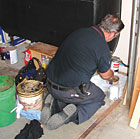
As home heating oil prices have gone down lately, many customers of HVAC service contractors are complaining of paying for locked in pricing and often take their wrath out on technicians.
The up-and-down price of heating oil has been a rollercoaster ride for consumers the past few months. In New York, the average price for home heating oil was $4.70/gallon on June 30. In early November, the price had dropped to $3.19/gallon. What may be more amazing is that the price was $3.16/gallon one year ago. These facts should make consumers happy as they head into the cold winter months, right? Not quite.
Many consumers, fearing that oil prices would rise even more as the summer wore on, locked in a price for their oil shipments this winter. As prices have dropped, the locked-in price has jumped past current prices, leaving many consumers virtually “holding the bag.”
As one oil retailer said recently, “It’s all a crap shoot. Sometimes the customer wins, sometimes they don’t. What they fail to realize is the oil company locked in at a higher wholesale rate to offer this deal. If the oil company lowers the rate who will make up the difference? But if the price spikes to $6 a gallon what will the customer say then? I bet they won’t offer to pay more.”
Ken Secor, a former New Jersey HVAC engineer, agreed the whole notion of locking in a price for oil is a crapshoot. “When oil was $140 a barrel some people entered pre-bought contracts at fixed per gallon prices,” he said.
“I waited. Lucky me. Oil dropped to $115 a barrel and I jumped on that, buying the year’s oil at $4.08 a gallon. I considered that good, compared to when crude was $140 a barrel. Animosity toward the U.S. could erupt in a spike that would make $4.08 a gallon pre-buy lock-ins appear like the deal of the decade. If you elect to pre-buy at firm pricing, today’s prices make that decision look questionable. However, the first gunshot can change that overnight.”
NORA CLARIFIES PRICING
The National Oilheat Research Alliance (NORA) recently published a press release explaining how oil prices are set. Here is a summary of what was in the release:“Heating oil is traded on the commodities market. This means heating oil cost is subject to fluctuations, just like the stock market. The price of crude oil has the biggest impact on the price of wholesale heating oil. Due to the variations in crude oil prices, dealers are generally price takers on any given day.
“Heating oil, like any energy product, responds to supply and demand fundamentals, such as cold or warm weather. Additionally, heating oil prices in this country may be affected by a supply disruption in an oil producing country, or even cold weather in Europe. On a daily basis, heating oil prices can vary widely.
Prices can change for a variety of reasons. These include:
• Seasonality in the demand for heating oil. When crude oil prices are steady, home heating oil prices tend to slowly rise in the winter months when demand is highest.
• Changes in the cost of crude oil. Crude oil is a major price component of heating oil, changes in the price of crude oil will generally affect the price of heating oil.
• Competition in local markets. Competitive differences can be substantial between a locality with only one or a few suppliers or dealers versus an area with a large number of competitors.
• Regional operating costs. Prices also are impacted by higher costs of transporting the product to remote locations. In addition, the cost of doing business by dealers can vary substantially depending on the area of the country in which the dealer is located. Costs of doing business include wages and salaries, benefits, equipment, lease/rent, insurance, overhead, and state and local fees.”
The NORA press release also noted that retailers and customers can enter into an agreement establishing a price for heating oil. This establishes a stable and known price for the heating season, and allows the customer to establish a firm budget for his heating oil needs. Fixed pricing may be varied by adjusting the number of gallons subject to fixed price. Additionally, some of these agreements include provisions allowing the contract to be ended for a pre-established fee.
Cap pricing is where a cap price creates a maximum price per gallon that homeowners will pay, regardless of whether the price of heating oil on the markets increase. However, it also allows the price of heating oil to fall if the price of heating oil falls during the heating season.

The job of an oil heat technician not only includes service but also the ability to lend a sympathetic ear to customers who are paying locked in oil prices.
DOWNSIDE PROTECTION
There is a way for consumers to protect themselves if the price of heating oil goes below their agreed-upon locked-in price. It is called downside protection or participation. In this scenario, if the price of oil drops, consumers get the benefit of the lower price. But this protection comes at a cost.For example, a Nov. 7 Website posting by Peterson Oil Service of Worcester, Mass., stated:
“Prepaid Payment Plan: $3.15 per gallon - Downside Protection: 40 cents per gallon up to $3.75.”
Similarly, Skylands Energy Service, Raritan, N.J., posted this statement on Nov. 7. “You will always pay the lesser of the market price or $4.699/gallon with downside participation. The $.30/gallon cost of downside participation will be added to your budget payment. Thus, our average customer burning 900 gallons a year will receive full downside protection for only $22.50 a month. We are strongly encouraging customers to sign up for downside protection. There is a chance the price of oil could drop precipitously, if the government acts on speculators.”
There is another option, too. Consumers can choose to “pay as they go” without a written contract. That seems to have worked - so far - for New York resident Ronald Mannino. “Some of us opted not to lock in with an oil company,” he said. “Before the summer, I canceled my contract with a full service oil company in an effort to control my costs for energy. I am not a gambling man, but it paid off for me. I would be one of the disgruntled consumers had I stayed on contract.
“Now that oil is affordable for the winter, we need to worry about is the economy. Food shopping seems to be the new worry in my life.”
And as Robert O’Brien of Technical Heating Co., Mt. Sinai, N.Y., said, “What can you say when someone is locked in at $5.09 until Dec. 31 and their neighbor paid $2.39 C.O.D. on Thursday? All in all, fixed prices are just not worth it to anyone with this volatile a market. It prevents a dealer from increasing margin to meet increased costs of doing business as well.”
Publication date:11/24/2008



